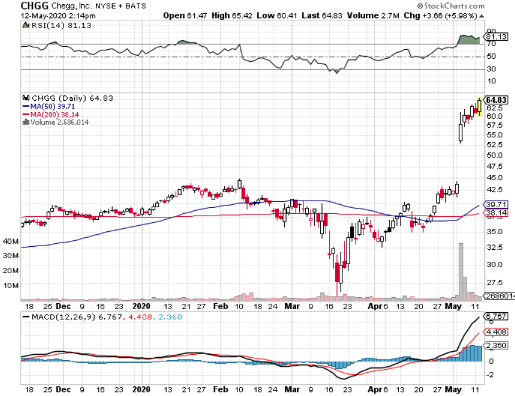Chegg is Another Winning "Stay at Home" Stock
There certainly will be crippling longer-term implications for the airline industry, hotel chains, and of course hospitality – but I can’t say the same for online learning platform Chegg (CHGG), which is now a great option if you're looking for tech stocks to invest in.
Chegg, is a U.S. education technology company based in Santa Clara, California who has hit pay dirt with this coronavirus epidemic.
Chegg provides digital textbook rentals, online tutoring, and other digital student services.
Schools around the U.S. and the world closed in an effort to slow the spread of the coronavirus as well as protecting our future leaders.
Despite the domestic economy on the verge of reopening, it is unclear when schools will.
Naturally, parents are also afraid to allow their children in a school environment where bacteria and germs act as a giant petri dish.
To read more about how schools are having a heck of a time reopening, click here.
Digital learning was already becoming part of the playbook, as college costs continued to soar unabated.
A rule of thumb in every industry is that a crisis often accelerates the inevitable and that is what I see happening in higher education.
Chegg is a portmanteau of the words chicken and egg and references the founders’ unenviable experience of being unable to obtain a job without experience while being unable to acquire experience without a job like many young graduates complain about.
With that in mind, the founders of Chegg, Aayush Phumbhra, Osman Rashid, and Josh Carlson, aspired to disrupt the textbook industry.
Business grew fast in the early stages – the company adjusted its business model to reflect that of Netflix's then rental-based model, concentrating on renting textbooks to students in 2007.
Eventually, the growth led into a textbook rental partnership with education mainstay Pearson Education.
Fast forward to today and Chegg’s stock chart looks like a hockey stick with shares going from $30 to $64 in 2 months.
Chegg’s first quarter revenue jumped 35%, with its services sales up 33% to account for 76% of its total revenue.
The firm also saw the number of Chegg Services subscribers surge 35% to over 3 million for the first time.
And the company forecasted that the momentum it experienced at the end of the first quarter will carry over into Q2, with it calling for its “Q2 subscriber growth to be greater than 45%.”
The substantial increase in engagement from existing subscribers is following through into a meaningful increase in the take rate of the new Chegg Study Pack, much earlier than expected.
Chegg Study Pack is a three-in-one package that bundles together Chegg Study, Chegg Math Solver, and EasyBib Plus. To understand more about the Chegg Study Pack and Chegg’s other online learning products, click here.
Chegg did not provide guidance for the second half of 2020 due to many unknowns such as school start dates, enrollment trends, and whether schools will be taught on-campus, online, or both.
The pain doesn’t stop with the toddler, what about the young adults?
The Graduating Class of 2020 is confronted with the worst hiring climate in history that has seen rescinded internships and evaporating job offers.
These students might back out of the job market completely before they get a sniff and elect to attend graduate school, meaning more online learning in the short-term.
To read about the hardships for fresh graduates, click here.
I am encouraged by Chegg's strong trends 1Q into 2Q and the broader shift of higher education in Chegg's wheelhouse, whether done on or off-campus.
Investors are focused on firms that can grow during semi-apocalyptic conditions, especially ones that seem poised for longer-term expansion within a future-looking industry like Chegg.
Meanwhile, Chegg’s adjusted second quarter earnings are expected to explode to 48% and EPS at $0.34 a share. Overall, the company’s adjusted fiscal year EPS figures are projected to surge to 33% and 22%, respectively.
Shares are overheated for the time being and readers should wait for a significant dip in shares as we approach the summer.
Buy that dip because remote learning is here to stay and first movers like Chegg will have staying power with their sticky products.
With the gains concentrated in biggest names in the Nasdaq, there is a sprinkling of uber growth names of the likes of Chegg, Docusign, Datadog, and Teladoc that are outperforming by an order of magnitude.
The issue I have with smaller cap tech stocks right now is that large cap tech stocks have durability because of balance sheet strength.
If there is a sell-off, investors will migrate further up the food chain, meaning FANGs.
As the FANGs make new highs, they continue to reward long-term investors paying a high premium of a future increase in cash flow.
Lastly, FANGs are the biggest beneficiary of the rerating of the tech market after the unprecedented surge of Fed helicopter money.
Sadly, the smaller caps do not get the lions’ share of the Fed funding funneled into its shares.
The bottom line is that the dreaded coronavirus is mutating from its original version, and this iteration has been reported to affect children.
To read about the virus mutation, please click here.
The reopening of schools is going to be staggered, expensive, unfair, and controversial in the best-case scenario.
It’s impossible to envision that students won’t be given a huge dose of Chegg’s digital learning products and even though not a FANG, the secular tailwinds in Chegg are too powerful to ignore, making it again, one of the good tech stocks to invest in.
I am bullish Chegg (CHGG).


